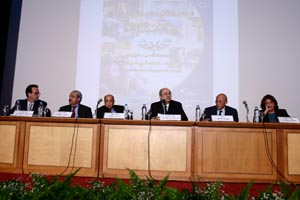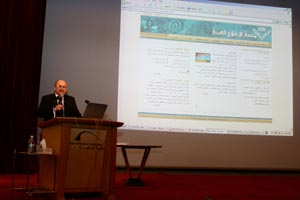The Second Arab Reform Forum begins
Posted on
Alexandria, 14 March 2005—The Second Arab Reform Conference on Successful Models of Civil Society Organizations, began on Sunday, 13 March. The opening session was attended by Dr. Ismail Serageldin, Director of the Bibliotheca Alexandrina; Dr. Gamal Mokhtar, President of the Arab Academy for Science and Technology (AAST); Mr. Sherif El Diwani on behalf of Dr. Shafik Gabr, Chairman of the Arab Business Council; Dr. Samir Radwan, Managing Director of the Economic Research Forum; Dr. Wadouda Badran, Director General of the Arab Women Organization; and Dr. Mohamed Fayek, Chairman of the Arab Organization for Human Rights.
The session began with Dr. Gamal Mokhtar, who spoke of AAST and how it provides more than 300,000 academic and training opportunities. He presented the role AAST played throughout the years in trying to maintain development of curricula so as to attain international standards, as well as the development and promotion of research and post-graduate studies. In addition, he spoke of AAST’s new project, “My School Online”, which aims to introduce primary, preparatory and high school curricula online.
A speech by Mr. Sherif El Diwani, on behalf of the Arab Business Council, followed where he asserted that reform has already been initiated in the Arab world. El Diwani pointed out the contributions made by countries and CSOs to help the Arab countries adapt to globalization.
Dr. Samir Radwan spoke of the Economic Research Forum, highlighting its active role in responding to immediate reform needs. He shed light on the Forum’s interest in post-war reconstruction and development of countries, in addition to unemployment. He added that there are optimistic indications of development and reform in Arab countries as many of them have started implementing reform programs with defined time-frames.
Dr. Mohamed Fayek, pointed out the necessity of benefiting from other reform experiences worldwide. He also added that democracy is the essential requirement for any country to achieve reform.
Dr. Wadouda Badran concluded the session with her speech on the importance of women’s issues, and how they are an essential factor for reform. She added that the Organization supports the empowerment of women and the defining of their role within the Arab world, as women are major players in realizing reform.
 |
|
 |
| The Opening Session |
|
Dr. Ismail during his presentation |